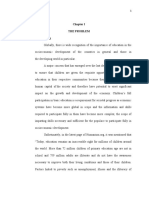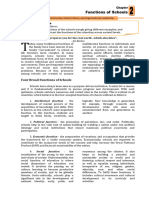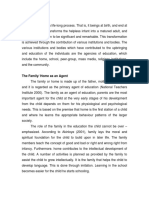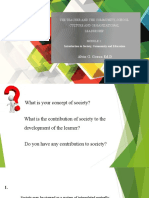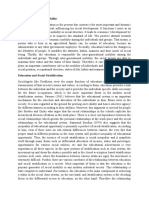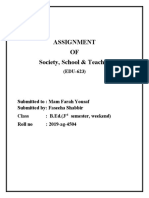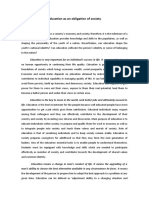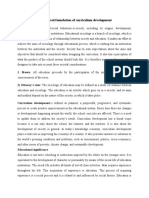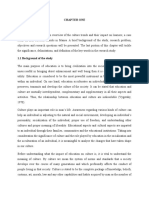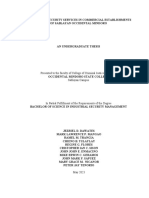Socitey and Culture Is Crucially Significant
Socitey and Culture Is Crucially Significant
Uploaded by
Glenz LeeCopyright:
Available Formats
Socitey and Culture Is Crucially Significant
Socitey and Culture Is Crucially Significant
Uploaded by
Glenz LeeOriginal Title
Copyright
Available Formats
Share this document
Did you find this document useful?
Is this content inappropriate?
Copyright:
Available Formats
Socitey and Culture Is Crucially Significant
Socitey and Culture Is Crucially Significant
Uploaded by
Glenz LeeCopyright:
Available Formats
SOCIETY AND CULTURE IS CRUCIALLY SIGNIFICANT TO THE OPERATION OF THE EDUCATION Amelia M.
Gano Gohang Elementary School Banaue, Ifugao Society, culture and education are linked together. Society itself is an educational system with set standards for the role and status of persons in it. Education should be relevant to the needs of society and society coordinates with education. Society cannot be formed without culture and vice versa. Culture provides knowledge as the information of education thus education is linked to culture and society depends much on the type of culture and education one receives. The school as an educational system is both a sub-society and sub-culture. It is a small society within a bigger society. It has its own culture, rules, regulations practices and traditions. The school and culture are very closely related. The school perpetuates culture transmission to the young. This is done through maintenance of values and attitudes. Worthwhile values and attitudes inculcated in the young contribute to the improvement of the culture. Through an improved culture the school draws out and develops for the betterment of the society. It is often maintained that the school must be relevant to society. Some people blame the school for providing the kind of training and preparation that is needed by society. The fact that there are many graduates of the school system who are unemployed or underemployed is cited as an example of irrelevance. This one example why the study of society and culture is important in our educational system is that the DepEd will provide the curriculum needed for the industrial and socio-economic development of the country and to decrease unemployment which is the number one problem of the society. As times change culture is being refined and revised with each generation through education as society undergo radical changes, the emphasis of value is indicated to the social pattern of the educational system for education is a reflection of our society.
WHY VALUES ARE NEVER THOROUGHLY UNDERSTOOD AND EFFECTIVELY INTERNALIZED? Amelia M. Gano Gohang Elementary School Banaue, Ifugao Values maybe defined as those standards to which group or society judges the desirability and importance of persons, ideas, actions, goals and other socio-cultural objects. It makes things desirable, attractive, worthy of approval and those which society in its experience has found satisfying and worthwhile. It is a shared conception or beliefs in what are considered contributory to the welfare of the group. They give meaning and significance to the totality of society and culture and influence the behavior of group member. Values is intimately related to the search for meaning in human life, that life is meaningful when man has found something capable of arousing his commitment to it, worth dying for since values are the soul of mans striving, having as their purpose to render human existence meaningful and to achieve the complete fulfillment of mans personality as individual and as a community. To discover the real essence of values we should never separate value from being. To separate value from being is to destroy value. It is that good to which man tends and vision which motivates man to action. The background why values are never thoroughly understood and effectively internalized is the Philippine society reflects a great variety of external forces, which emerge from cultural influence from the Malaysian, Hindu, Arabian, Chinese, Spanish, Japanese and American. Interpersonal and social relationships revalue around blood ties, marriage and ritual kinship. Spanish and American culture composes the Filipinos Occidentalism. Spanish influence is evidently manifested in the Filipinos religious, economic and cultural orientations. The introduction of a democratic system of government and the popularization f education by the Americans in the Filipino way of life intensified the Filipinos preference for academic whitecollar occupations. They infused new ideals pertaining to education. Presently our curriculum included some of the American leftover values that confused our young ones even the old on which to follow. It is not only in the DepEd where the government exposed the Filipino mind to conflicting and value orientation but the Balik Bayan program launched by the government through the Department of Tourism, Mass Media, religious rituals and national business contribute a conflicting values which they got and learned from other countries. With these forces around him, the Filipino has certainly displayed a remarkable adaptability resulting in a many sided cultural heritage. The Filipino culture and values that was borrowed had always been Filipinized and in the process, it has gradually become distinctly Filipino. This has resulted in a dichotomous outlook oriental and occidental, which left behind confusion to the young for there was no clear delineation of which in the indigenous value of the Filipinos. So whatever value orientation the Filipinos will ultimately follow with greater vigor, it is time alone that will tell.
THE SCHOOL A TYPICAL SOCIAL INSTITUTION, ITS SOCIAL STRUCTURE AND HOW IT FUNCTIONS AS A SOCIAL INSTITUTION Amelia M. Gano Gohang Elementary School Banaue, Ifugao Socialization is the transmission of culture. It starts from infancy and consist of those processes by which the individual becomes a member of his group. This starts in the home, where the child socializes with the member of the family. As the child grows, he moves out from the house and finds its peers. This is done in the school as the school as an institution is looked upon as the molder and reshaper of the youth. It is also in the school where the child internalizes the values and norms of acceptable behavior and acquires the behavior patterns appropriate to his role in the society. Therefore good socialization of the youth determines the kind of individual the youths role in the society through the educational institution. The social structure of the social institution consist of: 1. Organizational structure this is how the social institution organized the people working in that institution according to their roles and status. Status is the social standing in that organization. Roles are the responsibilities. There the organization of the worker according to their roles and status is related to one another who are involved in that organization. 2. Curriculum Structure the commonality of the school curriculum throughout the country. This includes the methodology, content, strategies and objectives. 3. School sub-culture the patterns of behavior that are unique to a given culture. The wearing of uniforms and school ID to students faculty and staff is an example. The function of a school as a social institution 1. Parent surrogates the school is assuming other functions that used to belong to the home and church. With many working parents, the children often times have no one to turn when they are in trouble. Sometimes teachers perform the role of babysitting to some children. 2. Instructional function the school perform the fulfillment of a true and meaningful education through a certification. This is the process of stamping peoples real of approval that tell the educational level of people, and shows how well they have performed. 3. Transmission of culture the culture of society is passed from one generation to the other through socialization and interaction between students, teachers and the school administration. Through interaction students, develop their skills and knowledge of rational and critical thinking and appreciation of their own culture. 4. The school fulfills the equalizing function thus promoting social mobility. It gives opportunities to move the social ladder through education. In this way children are given equal opportunities to get ahead through education. 5. It also fulfills the integrating function. It aims to unit conflicting group in the society through exposure of members to different sub-cultures and to develop in them the importance of tolerance and integration or social relationships.
6. The school is expected to accomplish development goals set by the government of the society, thus, it becomes an implementing arm of the government. Through the teaching of values education induces people to conform to the norms of society. 7. The liberating function wherein It frees the individual from the bondage of dependence and ignorance. In this school build national spirit where everyone has gone to school, knows that the school transmit nationalism, patriotism, loyalty and freedom. 8. The school is responsible for socialization. Helping the pupils find their roles and status in society and learn the forms of behavior that go with the roles and status. The school provide the venue for the development of the social abilities of people to associate with other people, thus it establishes social relationship to others.
You might also like
- Roles of TeacherDocument5 pagesRoles of TeacherCharlynjoy Abañas67% (3)
- Statistics and Probability Week 2 DLLDocument5 pagesStatistics and Probability Week 2 DLLJobelle Mostoles80% (5)
- TLE Learning PlanDocument5 pagesTLE Learning PlanBong Relox100% (4)
- Parental Involvement and Pupils AcademicDocument153 pagesParental Involvement and Pupils AcademicKiko HuitNo ratings yet
- EducationDocument11 pagesEducationRoxy100% (2)
- Creative Nonfiction ANSWER KEYDocument3 pagesCreative Nonfiction ANSWER KEYRhenzellemae83% (88)
- 04 - ESOL Teacher Notes Entry 2 Unit 4Document14 pages04 - ESOL Teacher Notes Entry 2 Unit 4WayneNo ratings yet
- EDUC 102 (Historical Foundation of Education)Document3 pagesEDUC 102 (Historical Foundation of Education)Tisha SedoriosaNo ratings yet
- Fundamental Roles and Functions of SchoolsDocument4 pagesFundamental Roles and Functions of SchoolsvreigelynmaeNo ratings yet
- Educ60 ReviewerDocument8 pagesEduc60 Reviewertc.jennyrose.gallentesNo ratings yet
- Competency #14 Ay 2022-2023 Social StudiesDocument22 pagesCompetency #14 Ay 2022-2023 Social StudiesCharis Rebanal100% (1)
- Education in The SocietyDocument6 pagesEducation in The Societyfebinbulsoc489No ratings yet
- CHAPTER XVFNDocument31 pagesCHAPTER XVFNnoe mayanaNo ratings yet
- Agencies of Education.Document4 pagesAgencies of Education.F. Lalrampari Rollno1No ratings yet
- Chapter 2 - Functions of Schools - GSuiteDocument8 pagesChapter 2 - Functions of Schools - GSuiteAngelica LunaNo ratings yet
- Education As A Social Function, Direction, Growth, Formation and OthersDocument8 pagesEducation As A Social Function, Direction, Growth, Formation and OthersArman Aldana AlibudbudNo ratings yet
- Agencies of EducationDocument8 pagesAgencies of EducationSalamKhan100% (1)
- Socialization and EducationDocument12 pagesSocialization and EducationsirmarmolNo ratings yet
- Unit 6 CECEDocument20 pagesUnit 6 CECEMr. SiddiquiNo ratings yet
- The School Society 1Document65 pagesThe School Society 1April Anne ErisNo ratings yet
- Meaning of Education, Sociology and Sociology of EducationDocument3 pagesMeaning of Education, Sociology and Sociology of Educationolusanyadaniel01No ratings yet
- The Role of Education in Social Transformation AlmiraDocument2 pagesThe Role of Education in Social Transformation AlmiraAira CalderonNo ratings yet
- Pre LimDocument1 pagePre LimZyra Manalo MeladNo ratings yet
- Impact of Economic and Cultural Differences in SocializationDocument7 pagesImpact of Economic and Cultural Differences in SocializationD.A ChasieNo ratings yet
- Christian Education Raw FileDocument8 pagesChristian Education Raw FileMuanlian Hatlang YTNo ratings yet
- Social Functions of Education:: - (Marks: 5)Document3 pagesSocial Functions of Education:: - (Marks: 5)Sameer KhalidNo ratings yet
- Module Three-Education SociolizationDocument45 pagesModule Three-Education Sociolizationzuberi hamzaNo ratings yet
- The Teacher and The Community, School Culture and Organizational Leadership Module 1Document20 pagesThe Teacher and The Community, School Culture and Organizational Leadership Module 1Josephine Pangan100% (6)
- Character EducationDocument18 pagesCharacter EducationEquus Sani100% (1)
- Education and Social StratificationDocument3 pagesEducation and Social StratificationC Lalrindika RN 008No ratings yet
- Role of Teachers in NigeriaDocument2 pagesRole of Teachers in NigeriaPhilip AmiolaNo ratings yet
- Bes 121 Solved Assignment January July 2019Document11 pagesBes 121 Solved Assignment January July 2019IGNOU ASSIGNMENTNo ratings yet
- Impact of Culture On Education Dr. Radhika KapurDocument4 pagesImpact of Culture On Education Dr. Radhika Kapurperry glennNo ratings yet
- Formal Education Socialogy Ass2Document5 pagesFormal Education Socialogy Ass2Tembo U KondwelaniNo ratings yet
- 101.sociological Aspects of Curriculum DevelopmentDocument7 pages101.sociological Aspects of Curriculum Developmentli lyuNo ratings yet
- The Role of The School As A Socializing AgentDocument1 pageThe Role of The School As A Socializing AgentKinza ArifNo ratings yet
- Module Three-Education SociolizationDocument47 pagesModule Three-Education Sociolizationzuberi hamzaNo ratings yet
- Role of Teacher in Socialization ProcessDocument15 pagesRole of Teacher in Socialization ProcessNamratha BalajeeNo ratings yet
- Education As A Social InstitutionDocument5 pagesEducation As A Social Institutionmendozamichael6386No ratings yet
- 2.elements of Culture AssignmentDocument5 pages2.elements of Culture AssignmentFaseeha ShabbirNo ratings yet
- Education As A Social ProcessDocument6 pagesEducation As A Social ProcessEarlitha100% (2)
- Original Edited Hope For A Child FormatedDocument72 pagesOriginal Edited Hope For A Child FormatedEsosa AgbontaenNo ratings yet
- Tvet Reflection PaperDocument6 pagesTvet Reflection PaperJocelyn AndalNo ratings yet
- Value Education: Delhi Technological UniversityDocument7 pagesValue Education: Delhi Technological UniversitySOURAV KUMARNo ratings yet
- Education As An Obligation of SocietyDocument3 pagesEducation As An Obligation of SocietyStogul OlgaNo ratings yet
- Agencies of Education-SeminarDocument6 pagesAgencies of Education-SeminarSanjeevNo ratings yet
- The Role of Value Based EducationDocument5 pagesThe Role of Value Based Educationbhanu priya100% (1)
- Malabanan, Laica Mae F. Fundamental Roles and Functions of School and Society EssayDocument2 pagesMalabanan, Laica Mae F. Fundamental Roles and Functions of School and Society Essaylaicamalabanan530No ratings yet
- Moral Education-The Role of The SchoolsDocument3 pagesMoral Education-The Role of The SchoolsDr Palto DattaNo ratings yet
- Research Output n History, Psychology and Philosophy of EducationDocument14 pagesResearch Output n History, Psychology and Philosophy of Educationella.mae.reodiqueNo ratings yet
- A Level Sociology Topic 7 EducationDocument10 pagesA Level Sociology Topic 7 EducationDakarirayi MutenherwaNo ratings yet
- Let's Check Your UnderstandingDocument4 pagesLet's Check Your UnderstandingMark Brian FloresNo ratings yet
- Educ 107 ReportingDocument46 pagesEduc 107 ReportingNomer E. MalagNo ratings yet
- Sociological Foundation of Curriculum DevelopmentDocument6 pagesSociological Foundation of Curriculum DevelopmentAdeeb Ahmad100% (1)
- BEST QualityEducationandCommunityEngagementtextDocument17 pagesBEST QualityEducationandCommunityEngagementtextsharmakhan433No ratings yet
- What Is Education As A Social InstitutionDocument2 pagesWhat Is Education As A Social Institutiontripti sanghiNo ratings yet
- ESS221 Chapter 2Document21 pagesESS221 Chapter 2NORLZANo ratings yet
- State Curriculum FrameworkDocument9 pagesState Curriculum Frameworkzumashireen786No ratings yet
- Activity 5Document2 pagesActivity 5flory mae gudiaNo ratings yet
- Prof. Ed 4 PPT ReviewerDocument14 pagesProf. Ed 4 PPT ReviewerChing OngNo ratings yet
- Education and Society What Type of RelationshipDocument7 pagesEducation and Society What Type of RelationshipFélix Eduardo100% (2)
- Becoming Member of SocietyDocument48 pagesBecoming Member of SocietyRencel AnecitoNo ratings yet
- Impact of Culture ProposalDocument13 pagesImpact of Culture Proposalpaul chishimbaNo ratings yet
- HGPH Info PackDocument3 pagesHGPH Info PackElmer GarchitorenaNo ratings yet
- Phonological Features of Basilectal Philippine English: An Exploratory StudyDocument9 pagesPhonological Features of Basilectal Philippine English: An Exploratory StudyItsme nnejNo ratings yet
- In This 10 Days Course You Will Learn The Basic NLP Tools and Techniques For WebsiteDocument3 pagesIn This 10 Days Course You Will Learn The Basic NLP Tools and Techniques For WebsiteMichiel Paulus100% (1)
- The Reading Test: What's in The Cambridge English: Advanced Reading Paper?Document23 pagesThe Reading Test: What's in The Cambridge English: Advanced Reading Paper?Zuzana GašparovičováNo ratings yet
- Fidp Pe 12 1ST SemDocument5 pagesFidp Pe 12 1ST SemDom1nus GamingNo ratings yet
- REGINALD BELTRAN ADIA - Career Path Within DepEd, Activities, Assessments & ReflectionsDocument5 pagesREGINALD BELTRAN ADIA - Career Path Within DepEd, Activities, Assessments & Reflectionsreginald_adia_1No ratings yet
- Use Kurt Lewin's Change Model in Change Management ImplementationsDocument20 pagesUse Kurt Lewin's Change Model in Change Management ImplementationsAnonymous GDOULL9100% (1)
- 40 Questions To Test Your Skill On R For Data ScienceDocument32 pages40 Questions To Test Your Skill On R For Data ScienceSuman DasNo ratings yet
- Review On Criminological ResearchDocument64 pagesReview On Criminological ResearchTIPAY, EMELIE L.100% (2)
- Thesis 1Document9 pagesThesis 1Mae GallimbasNo ratings yet
- 02-Goal Setting - ICanStudyDocument25 pages02-Goal Setting - ICanStudyproductivesaiveNo ratings yet
- Heart DiseaseDocument10 pagesHeart Diseaserahinikasiraj0% (1)
- Market Researcher's Training ModuleDocument7 pagesMarket Researcher's Training ModuleAniket AgrawalNo ratings yet
- BMGT525 Online Syllabus B Tuesday Fall 2021-2022Document1 pageBMGT525 Online Syllabus B Tuesday Fall 2021-2022Sara HalabiNo ratings yet
- Pilgrim Christian College: United Church of Christ in The Philippines Capistrano - Akut STS., Cagayan de Oro CityDocument11 pagesPilgrim Christian College: United Church of Christ in The Philippines Capistrano - Akut STS., Cagayan de Oro CityLeo TiempoNo ratings yet
- Metacognition: Republic of The Philippines University Town, Catarman Northern Samar Web: EmailDocument6 pagesMetacognition: Republic of The Philippines University Town, Catarman Northern Samar Web: EmailyoonglespianoNo ratings yet
- Articulated Difficulties of Grade 11 Students at Taytay Senior High School (TSHS) in English ProficiencyDocument17 pagesArticulated Difficulties of Grade 11 Students at Taytay Senior High School (TSHS) in English ProficiencyGlobal Research and Development Services100% (1)
- Latta Matthew 2012Document198 pagesLatta Matthew 2012nrbNo ratings yet
- Qualitative ResearchDocument21 pagesQualitative ResearchAshi JainNo ratings yet
- Teaching Philosophy-Chelsie LambertDocument25 pagesTeaching Philosophy-Chelsie Lambertapi-311387015No ratings yet
- Typology: Linguistics Syllables Suprasegmental PhonemicDocument6 pagesTypology: Linguistics Syllables Suprasegmental PhonemicHanie Balmedina-RazoNo ratings yet
- Make Their Own Sombrero Vueltiao: Sombrero Vueltiao Pictures Video of History of Sombrero VueltiaoDocument4 pagesMake Their Own Sombrero Vueltiao: Sombrero Vueltiao Pictures Video of History of Sombrero VueltiaoClaribel ValdezNo ratings yet
- Chap. 1 - Philosophy of MathematicsDocument2 pagesChap. 1 - Philosophy of Mathematicsfeby FebyNo ratings yet
- The Poet: A Sculpture by Ramkinkar Baij: TreasuresDocument7 pagesThe Poet: A Sculpture by Ramkinkar Baij: TreasuresShailesh DeshpandeNo ratings yet
- Into The Unknown Unknowns: Engaged Human Learning Through Participation in Language Model Agent ConversatioDocument39 pagesInto The Unknown Unknowns: Engaged Human Learning Through Participation in Language Model Agent ConversatioVenkata RamanenNo ratings yet
- Curriculum Vitae: Nishant JainDocument3 pagesCurriculum Vitae: Nishant JainRahul FosterNo ratings yet




